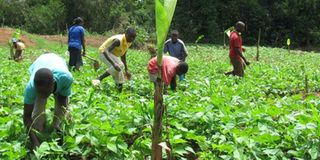Crop production decline piles pressure on household incomes

Farmers harvest beans. Bean production in the country has reduced from 886,443 tonnes in 2011 to 565,091 tonnes in 2012.
What you need to know:
The decline in crop production implies that food prices could continue rising, thus putting pressure on people’s incomes.
Kampala
The decline in crop production is putting pressure on household incomes, according to a new Uganda Bureau of Statistics (Ubos) survey.
The crop production decline implies that food prices which have been rising over the past two years will continue rising, a situation that is likely to put more pressure on inflation and household incomes. The Uganda National Panel Survey (UNPS) report indicates that bean production in the country declined from 886,443 tonnes in 2010/11 to 565,091 tonnes in 2011/12.
Similarly, banana production also decreased to 5.06 million tonnes from 7.79 million tonnes over the same period.
Mr James Muwonge, the director of socio-economic surveys, Ubos, attributed the decline in the crop production to the long dry spell and pests which are said to have affected crop yields.
Mr Christopher Kahirita, the chairman of general Central Organisation of Free Trade Unions, Uganda said apart from drought, the poor land usage patterns and not using fertilisers have also contributed greatly to a decline in crop yields. He said the government has not taken deliberate efforts to help farmers increase their productivity by teaching them modern farming methods and carrying out research in high yielding crops.
However, maize production in the country increased to 2.93 million tonnes last year from 1.87 million tonnes the previous year.
The production of groundnuts also increased to 293,040 tonnes from 182,388 tonnes while that of rice increased to 360,728 tonnes from 143,931 tonnes. According to Mr Stephen Baryahirwa, the Ubos principal statistician in the directorate of socio-economic surveys, the proportion of incomes people spend on food has been increasing over the past three years from 45 per cent in 2009/10 to 51 per cent in 2010/11 and 52 per cent last year.
However, global agricultural production is also expected to decline, according to a recent Organisation for Economic Cooperation and Development and the Food and Agriculture Organisation report. It indicates that it is expected to grow averagely at 1.5 per cent annually over the next decade, compared with the 2.1 per cent annual growth rate between 2003 and 2012.




